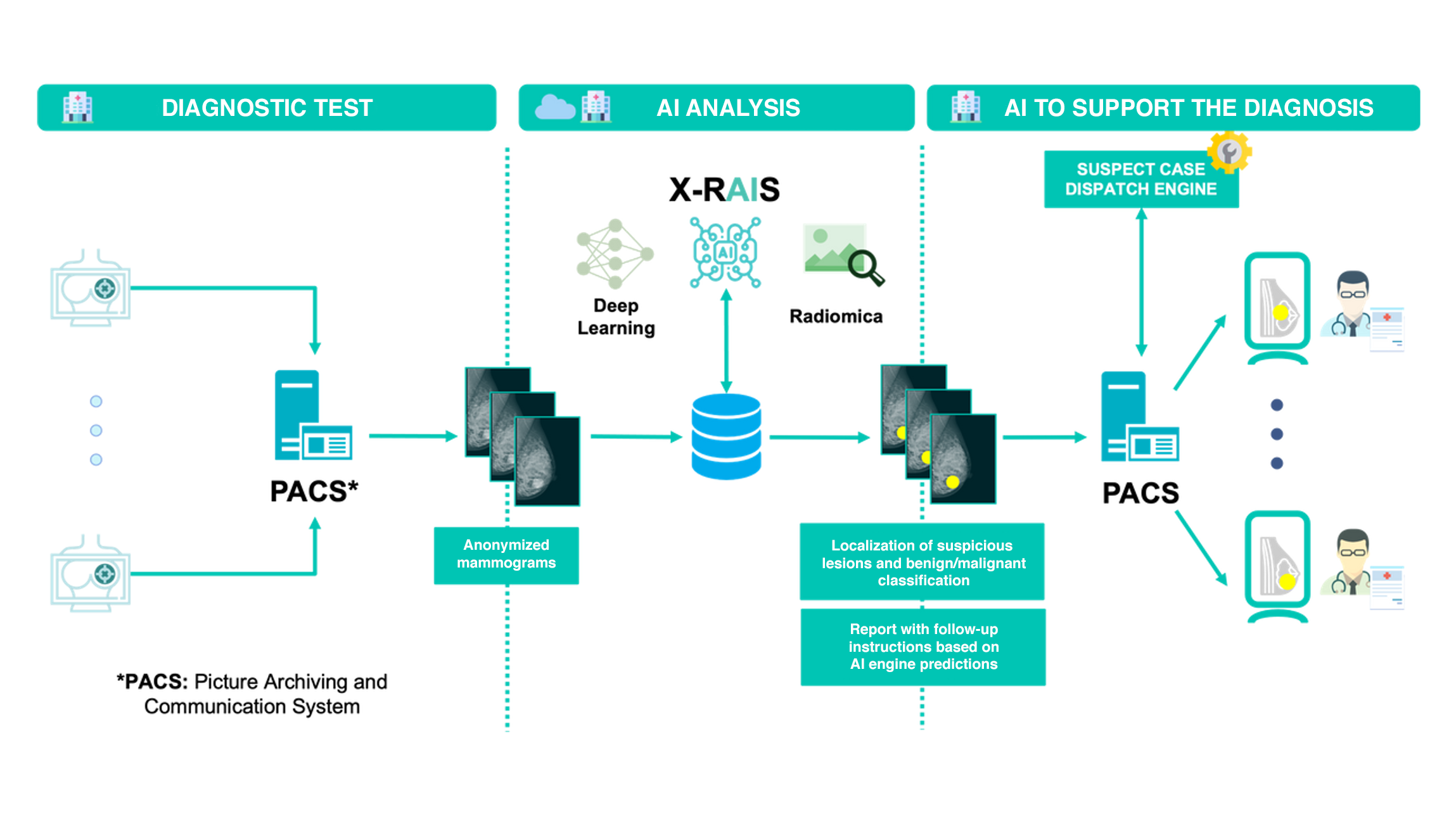,allowExpansion)
X-RAIS: the third eye in medical imaging
An AI platform applied to the analysis of medical images to reduce the time-to-market of solutions supporting physicians and radiologists.
)
Deep Learning models for breast cancer screening
Deep Learning models for breast cancer screening
Artificial intelligence (AI) solutions are transforming our world, becoming increasingly widespread in healthcare and in the way health services are delivered.
Clinical and scientific practices produce a significant amount of data on a daily basis. The potential of this data is in danger of not being exploited, unless adequate information technology tools are available.
However, there is evidence of a growing willingness toward investments in digital healthcare among healthcare companies seeking to promote the development of care models based on AI data platforms for data exploitation.
The solution
,allowExpansion)
X-RAIS is a medical image analysis AI platform based on neural networks and radiomics. It is verticalized to different diagnostic methods (e.g., radiography, ultrasound, CT, MRI, etc.) and specific anatomical regions.
X-RAIS supports physicians by acting as a cognitive assistant in the diagnosis and reporting stages. It automatically suggests suspicious areas and their classification with the aim of reducing the number of misdiagnoses and improving the efficiency of the entire diagnostic process.
X-RAIS stems from the combination of Laife Reply's technological expertise and the domain knowledge of several healthcare companies, which contributed to the development of the solution by providing an abundance of clinical data and sharing their experience applied to clinical processes.
Application examples
Mammographic images
X-RAIS’ first area of specialization concerns the analysis of mammographic images in order to support radiologists with diagnoses and reporting. Breast cancer is the most common cancer among women (30.3% - source AIRC) and diagnosing it requires highly specialized personnel.
Several scientific partners actively collaborated on the project, providing both the anonymized clinical data and the know-how for its annotation. In particular, partnerships with IRCCS IEO, ICS Maugeri, and ULLS2 Marca Trevigiana have made it possible to train models for the localization and classification of suspicious microcalcifications, radiopacity, and suspicious breast lesions respectively.
Chest X-rays
During the Covid-19 pandemic, as part of the ALFABETO project – a project developed in partnership with ICS Maugeri and the University of Pavia – X-RAIS specialized in the analysis of chest X-rays and associated clinical data. In particular, the solution made it possible to support healthcare personnel in triaging symptomatic patients in their homes. By analyzing instrumental, anamnestic, and chest X-ray data, X-RAIS assesses the degree of severity of the disease and suggests the best care strategy for the healthcare provider to implement.
MRIs of the brain
Continuous research and development have made it possible to develop a new X-RAIS specialization in 3D image analysis, specifically MRIs of the brain. Artificial intelligence models capable of segmenting and classifying the level of severity of glioma, the most frequent tumor affecting the central nervous system with a high degree of malignancy whose growth is both diffusive and proliferative, have been trained in this area.
Benefits
X-RAIS is an autonomous medical image analysis system that implements operational support for medical personnel in the diagnosis and reporting phases, improving the efficiency of the entire diagnostic process.
X-RAIS is able to perform smart triage through the automatic analysis of test results. In fact, X-RAIS analyzes clinical images acquired through diagnostic equipment, processes them, and returns the outcomes (identified lesions and reports) to the PACS, highlighting the tests that have suspicious outcomes. These tests thus automatically take high priority for specialized personnel.
Given the high number of tests and the limited time available to interpret them, X-RAIS is of paramount importance in screening practices. For the purpose of prevention, intercepting patients with suspicious outcomes makes it possible to act in a timely manner, significantly reducing the waiting time for subsequent follow-up investigations.
For healthcare providers, X-RAIS represents a new decision support system in daily clinical practice which is able to reduce misdiagnosis-related risks and improve patient experience through timely follow-up management.

SAAS approach
The platform consists of technology modules (e.g., APIs, Web Services, etc.) that connect to diagnostic systems (RIS, PACS, etc.) through DICOM node integration, routines for anonymization and protection of sensitive data, and vertical modules for value-based healthcare.
Cognitive and Artificial Intelligence services offered by cloud architectures enable X-RAIS to be operationally applied in any context. X-RAIS guarantees data integrity and confidentiality, which are crucial in light of the new privacy regulations in force (GDPR). X-RAIS can be used on a pay-per-use or periodic subscription basis. In certain cases, the specific architecture of X-RAIS also allows for on-prem installation or use.
Upcoming challenges
At present, research and development activities are ongoing for further platform specializations – for example, histopathological imaging related to the identification of new biomarkers.
Histological and cytological images contain a great deal of information that is complementary and correlated with other clinical, genomic, and laboratory indicators.
With the availability of advanced analytical tools, different types of tissue can be digitized, new biomarkers can be extracted, and artificial intelligence models can be developed in order to improve the diagnosis and prognosis of individual patient-specific diseases (precision medicine).
Laife Reply, Reply Group’s Business Unit, operates in the Health, Welfare and Pharma sectors and implements artificial intelligence solutions ranging from Medical Imaging, Drug Discovery and Digital Therapeutics, to Natural Language Processing for the analysis of unstructured data.
,allowExpansion)